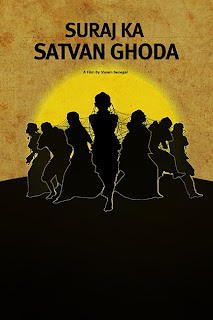Thanks to a post I read of Jai Arjun Singh, I happened to see two of NFDC's movies that were released during the early eighties. One was Shyam Benegal's Suraj ka Satva Ghoda, and the other was Tapan Sinha's Ek Doctor Ki Maut. The former is an account of the raconteur played to perfection by Rajit Kapoor, who, in his debut role, portrayed the experiences of a young, hapless lover whose love gets jilted not once but thrice when his love for three girls( in three different stories) remains unrequited. Rajeshwari Sachdev, Pallavi Joshi and Neena Gupta portray the roles of the three girls, and each story, narrated by the hero to his eager friends who come flocking to his house to hear a fascinating tale based on jilted love,elicits a discussion on love, as a reflection of the socio-economic status of the lovers. In each story, our hero is doomed from the beginning as he is one of the most passive lovers around. One of his friends, played by Raghubir Yadav, has an imagination that borders on paranoia.Whatever tales that he hears our hero narrating, he goes and dreams about the characters in the most grotesque and visually disturbing manner, so that his account of those same dreams is partly comic and partly macabre. At the end of it, some images from the hero's past come to haunt him and we are left with a sense of his failure to do anything worthwhile at all.
But the better of the two was the second movie, Ek Doctor Ki Maut. As a scientist, I think it completely enamored me to the doctor, played by the inimitable Pankaj Kapoor, whose trials and tribulations as a part time scientist on the quest to find a cure for leprosy, ultimately spelt doom for him.As far as my knowledge goes, this would have to be the only movie ever made in India, that gives you the inside view of how research goes on and what a scientist faces in terms of the struggle, the hard work, the disillusion, the high of new discovery, the pain of failure and....eventually how he needs to publish his paper to get his discovery projected to the outside world.
Pankaj Kapoor, as the humble doctor turned scientist, with a passion for his research, is a delight to watch, and Shabana Azmi is simply brilliant as his long suffering wife, who initially craves his attention and feels completely left out because of the complete devotion to his work yet who eventually becomes his biggest support in his quest to get recognition for his work. The chemistry between the two is simply awesome, and they portray the ever changing pattern of love between two people who are together for such a long time that all they need to convey love is a smile, a nod, a look and yet remain madly in love with each other. Shabana, with her tear filled eyes, literally needs no dialogues to convey her thoughts, something I observed in another power packed performance in Arth.
After ten long years of research, Dr Dipankar Roy finally discovers a vaccine for leprosy, which when innoculated into pregnant mothers, makes their child immune to the debilitating disease. His friend who is a science correspondent( played by the young Irfan Khan), writes about this in his newspaper and this starts an avalanche of criticism from all other doctors who simply find it unbelievable that a common average doctor like Dipankar, can do something so seminal and original. As he is a government Doctor, Dipankar cannot go ahead and publish his work without the government's approval. So begins a struggle in which Dipankar, who thought his lab was the world, now begins to see that the world is a much more difficult place and mere passion for work is not sufficient.
Until the very end, we see a losing battle, and finally, someone else, a team from London, beats him to the publication. But all Dipankar has to say is that finally, leprosy has been eradicated from the world. There are some great scenes in the movie which provide an insight into Dipankar's way of thought. The best one is , when he gets transferred to a village near Calcutta, and his wife comes to see him. He is sick, tired, overworked and lonely without his wife. Yet, he tells her, during a stroll on the beach, that at night, when he sees the stars shining, he thinks that they are mocking mankind that in the wide universe, there are so many umpteen mysteries to be solved, yet the only thing men on this planet do is find ways of fighting and backstabbing each other. We understand how his mind works, and later, when his wife is dusting his lab, she finds that in one of his notes, he has scribbled " So much to do, so little is done. Hurry up!" The smile on her face and the sadness in her eyes tell us that now, finally, she completely understands what her husband stands for. A must watch!!

